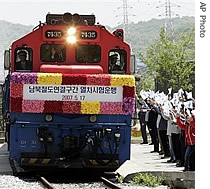2007年VOA标准英语-Inter-Korean Cooperation Grows(在线收听)
Seoul, South Korea
04 June 2007
From trains to tourism, from industry to sports, cooperation between the two Koreas is picking up momentum again, less than a year after the North tested its first nuclear weapon. VOA's Kurt Achin reports from Seoul.
 |
| A train passes the gate for the Demilitarized Zone as South Koreans wave unification flags near Dorasan Station near the Demilitarized Zone (DMZ) of Panmunjom, in Paju, north of Seoul, South Korea, 17 May 2007 |
The test of the railway is a symbol of a resurgence in inter-Korean cooperation. The two countries have never formally ended their 1950s war. Although relations have improved since 2000, ties cooled abruptly last October, when the North tested its first nuclear weapon.
But now, the South is pushing ahead with its policy of economic engagement with the impoverished North. Seoul is expanding an industrial park in the North Korean city of Kaesong. Thousands of North Koreans work there in South Korean-owned factories. Bookings are picking up for a South Korean-operated tourism zone at the North's Kumgang Mountain. And North Korean officials recently visited Seoul for minister-level talks.
Peter Beck, Northeast Asia director for the International Crisis Group, says all of this is made possible by Pyongyang's promise to dismantle its nuclear weapon programs. "Really, the February 13th agreement was viewed as a green light for Seoul to proceed full speed ahead with North-South cooperation activities."
North Korea missed an April deadline to start shutting its main nuclear facility. Pyongyang blames the delay on a problem moving its money from a Macau bank.
Beck, however, says South Korean aid may undermine the North's willingness to cooperate on the nuclear issue. "The North is getting hundreds of millions of dollars of assistance, and it takes a very powerful reason away from the North for complying with the obligations it's committed itself to in the six-party talks."
But most experts say South Korea's engagement policy is about more than eliminating North Korea's nuclear weapons.
South Korean Prime Minister Han Duck-soo recently said his government wants to bring about slow change in the Stalinist North - to help it strengthen its economy and open up to the world. Seoul wants to avoid an economic or political collapse in the North. "Without the opening of the North Korean economy, and without committing themselves to more reliance on markets, the fundamental solution of the problems will not be possible," said the prime minister.
Ryoo Kihl-jae is a dean at Seoul's Kyungnam University Graduate School of North Korean Studies. He said, "In the long-run, you need various tactics to help North Korea become part of international society. They will need a partner like South Korea to come out to international society."
Ryoo, however, says Seoul will not wait indefinitely for Pyongyang to end its nuclear programs. South Korea has delayed an aid shipment of rice to the North until it takes the first step of the February agreement. Still, for the foreseeable future, most experts say any South Korean government – progressive or conservative – has no other option than to engage the North.